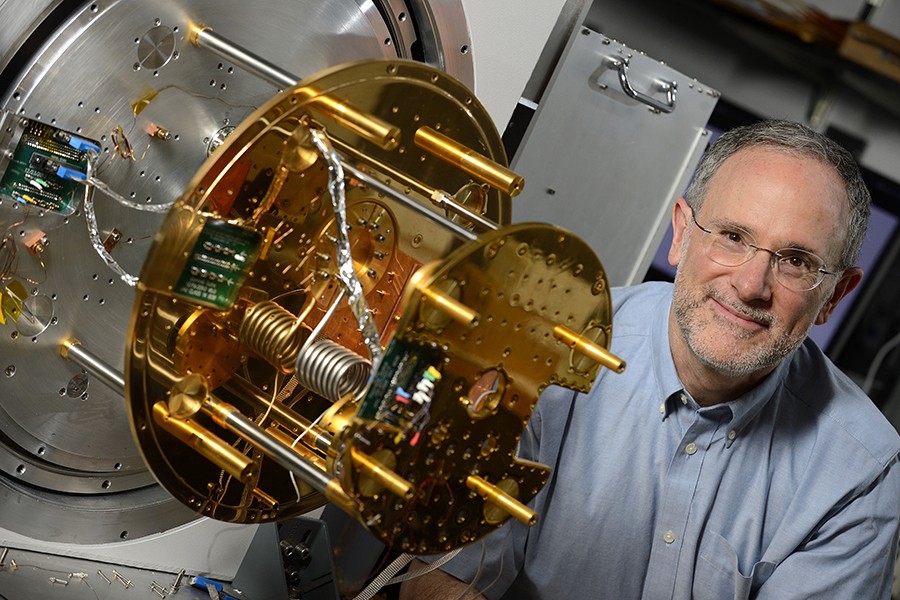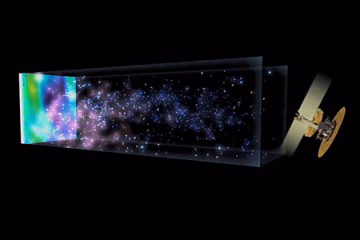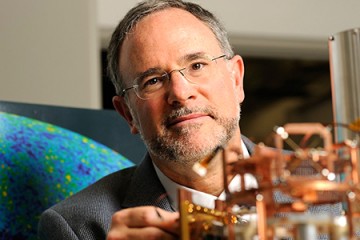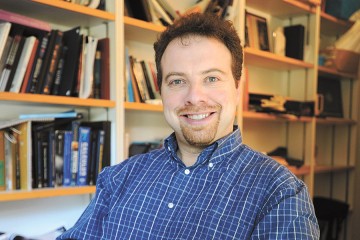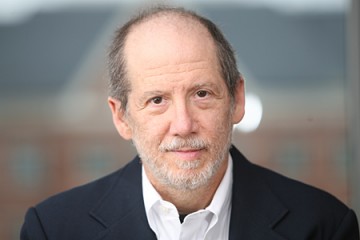Johns Hopkins University astrophysicist Charles L. Bennett has been named a recipient of the Breakthrough Prize in Fundamental Physics for his work that established the Standard Model of Cosmology—a precise, physics-based description of the contents, dynamics, and shape of the universe.
Bennett, a Bloomberg Distinguished Professor at Johns Hopkins, was the leader of the Wilkinson Microwave Anisotropy Probe, or WMAP, space mission. The entire mission science team will share the $3 million prize, the most lucrative prize in science.
Video credit: YouTube / National Geographic Channel
Bennett received the award at a star-studded black-tie ceremony Sunday night in Palo Alto, California, hosted by actor Morgan Freeman. Actresses Kerry Washington and Mila Kunis, actor Ashton Kutcher, filmmaker Ron Howard, and hip-hop artist artist Wiz Khalifa also took part in the ceremony. Awards in physics, life sciences, and mathematics were presented at the NASA Ames Research Center in Silicon Valley.
The Hollywood touch is part of an effort to draw public interest to science by the Breakthrough Prize, which was established by, among others, the founders of Google and Facebook. Bennett said he's all for that, especially if it encourages young people to pursue science, even if the ceremony will be outside of his usual experience.
"It's been a long time since I chatted with Ron Howard—as in never," Bennett quipped. "It's so overwhelming."
Using WMAP, a NASA project that launched in 2001 and switched off in 2010, Bennett and his team provided the first-ever detailed, full-sky "baby picture" of the universe when it was only 380,000 years old. The patterns in this picture provided precise answers to many longstanding questions about our universe.
"The WMAP mission took us far beyond our physical reach. By carefully measuring the oldest light in the universe, we determined the key properties of our universe," Bennett said. "We are humbled but pleased that our research has been recognized by the Breakthrough Prize Foundation."
WMAP is widely recognized as being transformational by turning a collection of loose facts into a highly constrained model of the universe: the Standard Model of Cosmology. Bennett received the NASA Outstanding Leadership Medal for his role as the Principal Investigator of WMAP.
"We are immensely proud of Chuck Bennett," said Johns Hopkins University President Ronald J. Daniels, who will be in California on Sunday evening to celebrate Bennett's win. "Chuck and his WMAP team's discoveries are both galactic and humbling in their significance for science and humanity. They inspire awe and ignite the imaginations of so many—particularly young scientists—with a passion to understand how our universe began and where it is headed."
Bennett is the third member of the Johns Hopkins faculty to receive the Breakthrough Prize since it was first awarded in 2012. Johns Hopkins Medicine researcher Bert Vogelstein received the Breakthrough Prize in Life Sciences in 2013 for his work on cancer genomics and tumor suppressor genes. In 2014, astrophysicist and Nobel laureate Adam Riess shared the Fundamental Physics Award for his discovery of the acceleration of the universe.
Video credit: Johns Hopkins University
Bennett's team used the sky map to determine that the age of the universe is 13.8 billion years and that the universe is made up of only 5 percent atoms, with an additional 25 percent of dark matter, which exhibits gravity but gives off no light. Seventy percent of the universe was measured by WMAP to be dark energy, which acts as antigravity and seems to be consistent with the "cosmological constant" introduced by Albert Einstein. Presumably this dark energy is responsible for the current accelerating expansion of the universe.
Janet Weiland, a Johns Hopkins University research scientist, also will share in the prize, as will two former Johns Hopkins University post-doctoral fellows who worked with Bennett, David Larson and Ben Gold.
The Breakthrough Prizes were founded by entrepreneur and philanthropist Yuri Milner and his wife, Julie; Sergey Brin, co-founder of Google; Anne Wojcicki, founder of the genetics company 23andMe; and Mark Zuckerberg, founder of Facebook, and his wife, Priscilla Chan. The innovators established the prizes to celebrate the world's great science and math minds and to generate excitement about the pursuit of these fields as careers.
Selection committees composed of previous Breakthrough Prize laureates choose the new laureates.
Bennett adds the Breakthrough Prize to a long list of awards recognizing his work in cosmology. His previous awards include:
- 2017 Isaac Newton Medal and Prize
- 2015 Caterina Tomassoni and Felice Pietro Chisesi Prize
- 2013 Jansky Prize
- 2012 Gruber Cosmology Prize
- 2010 Shaw Prize
- 2009 Comstock Prize in Physics
- 2006 Harvey Prize
- 2006 Gruber Cosmology Prize
- 2005 Henry Draper Medal
- 2003 John C. Lindsay Memorial Award
Bennett is a member of the National Academy of Sciences, the American Academy of Arts and Sciences, and a Fellow of the American Physical Society. He is also the Alumni Centennial Professor of Physics and Astronomy and a Gilman Scholar at Johns Hopkins University.
Posted in Science+Technology
Tagged cosmology, charles bennett, astrophysics, wmap




